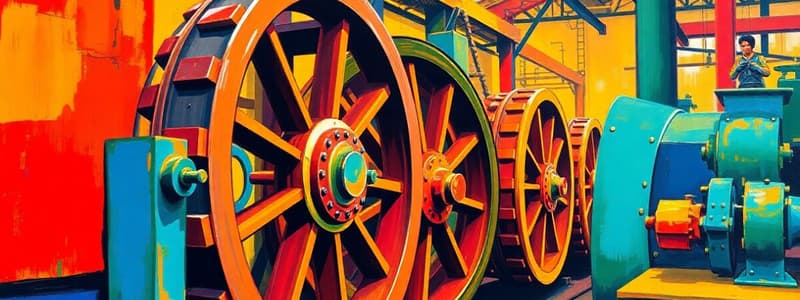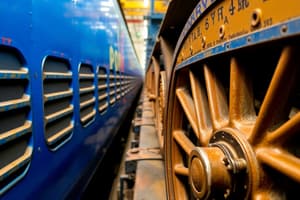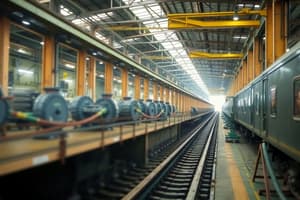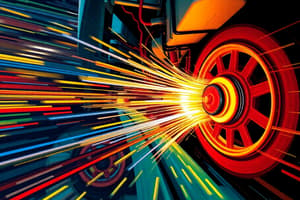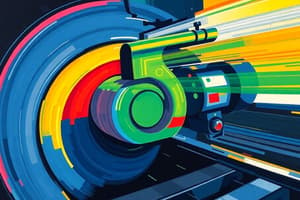Podcast
Questions and Answers
What role do the hammers in the Long Forging machine have?
What role do the hammers in the Long Forging machine have?
What processes are the rough forged axles subjected to after end cutting?
What processes are the rough forged axles subjected to after end cutting?
What is the purpose of precision borers in the wheel set assembly process?
What is the purpose of precision borers in the wheel set assembly process?
Which company supplied the highly automated wheel set assembly complex?
Which company supplied the highly automated wheel set assembly complex?
Signup and view all the answers
What does RWF primarily convert into wheel sets?
What does RWF primarily convert into wheel sets?
Signup and view all the answers
What is recorded automatically during the wheel pressing process?
What is recorded automatically during the wheel pressing process?
Signup and view all the answers
What characteristic of RWF's manufacturing process minimizes human error?
What characteristic of RWF's manufacturing process minimizes human error?
Signup and view all the answers
What is a key feature of every product manufactured by RWF?
What is a key feature of every product manufactured by RWF?
Signup and view all the answers
Which of the following statements accurately describes the Rail Wheel Factory's manufacturing process?
Which of the following statements accurately describes the Rail Wheel Factory's manufacturing process?
Signup and view all the answers
After the boring process, how are the wheels transported to the assembly complex?
After the boring process, how are the wheels transported to the assembly complex?
Signup and view all the answers
What is the planned capacity of the Rail Wheel Factory for manufacturing wheels?
What is the planned capacity of the Rail Wheel Factory for manufacturing wheels?
Signup and view all the answers
What type of machines are used in the axle machining lines at RWF?
What type of machines are used in the axle machining lines at RWF?
Signup and view all the answers
In what year was the Rail Wheel Factory established?
In what year was the Rail Wheel Factory established?
Signup and view all the answers
What is the primary purpose of the Spectrometer in the manufacturing process?
What is the primary purpose of the Spectrometer in the manufacturing process?
Signup and view all the answers
What distinguishes the Rail Wheel Factory from other manufacturing units in the Indian Railways?
What distinguishes the Rail Wheel Factory from other manufacturing units in the Indian Railways?
Signup and view all the answers
How long does it take to cast a wheel at the Rail Wheel Factory?
How long does it take to cast a wheel at the Rail Wheel Factory?
Signup and view all the answers
What is the temperature to which blooms are heated in the Rotary Hearth Furnace?
What is the temperature to which blooms are heated in the Rotary Hearth Furnace?
Signup and view all the answers
The casting process for wheels employs what kind of moulds?
The casting process for wheels employs what kind of moulds?
Signup and view all the answers
What process follows the casting of wheels to ensure their quality?
What process follows the casting of wheels to ensure their quality?
Signup and view all the answers
What type of technology did the Rail Wheel Factory adopt for its wheel-casting process?
What type of technology did the Rail Wheel Factory adopt for its wheel-casting process?
Signup and view all the answers
Study Notes
Rail Wheel Factory (RWF)
- RWF is a manufacturing unit of Indian Railways, producing wheels, axles, and wheel sets for railroad wagons, coaches, and locomotives.
- Located in Yelahanka, Bangalore, Karnataka.
- Founded in 1984.
- Previously known as the Wheel and Axle plant.
- Renamed Rail Wheel Factory after becoming part of the Indian Railway Ministry.
- Founded by C.K. Jaffer Sharief, the then Railway Minister.
- First Indian Railways unit to receive ISO 9001:2008 accreditation.
Manufacturing Processes
- Wheels: Uses cast steel technology using scrap steel from railway workshops.
- Manufacturing capacity: 200,000 wheels, 100,000 axles, 70,000 wheel sets.
- Casting process using controlled pressure pouring technology, obtaining technology from M/s. Griffin Wheel Co., USA. Raw materials include scrap wheels, axles, and parts of railway bogies.
- Molten metal steel chemistry is determined via spectrometers.
- Casting into graphite molds, which are pre-heated, split, and the risers are detached.
- Heat treatment, cleaning, Magnaglo testing, Ultrasonic testing, and peening
- Machining focuses on precise boring of the central hub where the axle fits.
-
Axles: Converts steel blooms (raw steel) through forging, heat treatment, and machining processes.
- Blooms are heated to 1200°C in a Rotary Hearth Furnace, then transferred to a precision forging machine.
- Hammers shape the billets into the required axle form using CNC.
- Heat treatment in normalizing and tempering furnaces.
- Two CNC machining lines convert forgings into axles.
- Loco axles, BOX N, Coaching, and Container axles are also converted into wheel sets.
- Axles are generally sent to workshops for converting them to wheel sets.
Assembly and Quality Control
- Automated Wheel Set Assembly: Highly automated assembly complex from Simmons Machine Tool Corporation, USA.
- Automated Measurements: Wheel seat sizes of machined axles are measured, and wheels are bored based on these sizes for correct interference with the axles.
- Automated Conveyors: Wheels and axles are carried through automated conveyors to the assembly complex, ensuring the correctness of pressing forces.
- Automatic Force Recording: Pressing forces are recorded automatically, maintaining consistent assembly parameters.
- Quality Control: Every product is manufactured per customer requirements, inspected, and tested to ensure reliability. Most machining processes are automated, reducing human error.
Studying That Suits You
Use AI to generate personalized quizzes and flashcards to suit your learning preferences.
Related Documents
Description
Explore the Rail Wheel Factory, a key manufacturing unit of Indian Railways located in Bangalore. This quiz covers its history, manufacturing processes, and production capabilities. Test your knowledge about its significant contributions to the Indian railway system.
